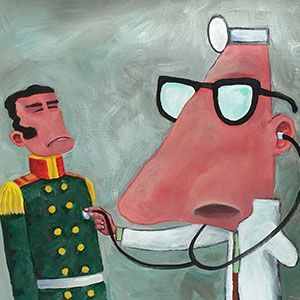cover story one
AI-Powered Olfactory Sensor Technology
The electronic nose in medicine
BY Chris Campbell, CEO
The field of medical diagnostics is rapidly evolving with transformative advancements in every field. An area of particular significance involves the integration of artificial intelligence (AI) olfactory sensor technology. AI-powered olfactory sensor technology promises to reshape how we detect and diagnose a wide range of medical conditions, making health care more accessible and efficacious than ever before.
cover story two
Colorectal Cancer: An alarming increase among younger adults
By Michael Sapienza and John Marshall, MD
If you think colorectal cancer (CRC) affects only older Americans, you’re wrong. Jenna Scott, 38, first began experiencing symptoms of early-onset CRC at age 29 during her seventh month of pregnancy. Given her otherwise clean bill of health, the symptoms were assumed to be peri/postpartum and the CRC went undiagnosed until she was 31. She entered remission after two years of treatment but has since dealt with recurrent cancers. A 20-year-old college running back, Khalil Smith, began to feel more tired than usual after practices before experiencing lightheadedness, stomach pain and unexplained weight loss.
Quality Improvement
The Assisted Living Report Card: An important new decision-making tool
By Tetyana P. Shippee, PhD, Kelly Moeller, MPH, Tricia Skarphol, MA, Rachel Shands, MSW and Lauren Glass, MSW, LGSW
A growing number of older adults choose to use assisted living for their care. Yet there are few if any evidence-based tools available for comparison across providers. This article provides an overview of a recently developed tool, the Assisted Living (AL) Report Card, why it was developed and how it is being used.
Architecture

Health Care Architecture Honor Roll 2024
For the past 36 years, Minnesota Physician’s Health Care Architecture Honor Roll has recognized outstanding achievement in new facilities design. The projects featured this year were all begun under the shadow of COVID-19, which somehow did not slow both the start and completion of a surprisingly large number of outstanding new facilities. They will serve patients at sites throughout Minnesota and on the borders of neighboring states. Our thanks to all those who participated in this year’s Honor Roll.
Home Care
Physicians and Home Care: Building new partnerships
By Kathy Messerli
As health care costs continue to rise and workforce shortages plague every sector of health care delivery, improved system interoperability is increasingly important. Physicians are on the front end of patient care, making diagnoses and developing care plans, but the amount of time they spend with each patient compared to the amount of care a patient may require, often on a daily basis, creates a huge gap that can have significant impact on health status and care plan outcomes. Home care is a critical delivery of care that helps bridge this gap, but unfortunately there are many reasons why the connection between physicians and home care services needs to be improved.











